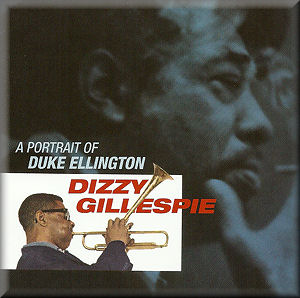1. In a Mellow Tone
2. Things Ain't What They Used To Be
3. Serenade To Sweden
4. Chelsea Bridge
5. Upper Manhattan Medical Group
6. Do Nothin' Till You Hear From Me
7. Caravan
8. Sophisticated Lady
9. Johnny Come Lately
10. Perdido
11. Come Sunday
12. Lorraine
13. Norm's Norm
14. A Night in Tunisia
Tracks 1-11
Dizzy Gillespie - Trumpet
Bennie Green - Trombone
Robert de Domenica - Flute
Stan Webb, Paul Richie, John Murtaugh, Ernest Bright - Woodwinds
Richard Berg, Ray Alonge, Joe Singer - French horns
John McAllister - Tuba
George Devens - Vibes
Hank Jones - Piano, cello
George Duvivier - Bass
Charlie Persip - Drums
Tracks 12-14
Dizzy Gillespie - trumpet
Leo Wright - Alto sax, flute
Junior Mance - Piano
Art Davis - Bass
Al Dreares - Drums
Originally released in 1960, this album exhibits Dizzy Gillespie's appreciation for Duke Ellington, and it reminds us what a superbly versatile composer Ellington was (with and without his alter ego, Billy Strayhorn). Gillespie is backed by an unusual orchestra containing French horns, tuba and various woodwinds. The subtle arrangements are by pianist Clare Fischer and their refinement makes a nice change from the powerhouse jazz that was produced by the Gillespie big band. In fact this LP brought deserved recognition to Fischer after he had worked for several years as arranger and accompanist for the Hi-Los.
This album was recorded the year after Dizzy had appeared on the Ellington album Jazz Party. It was certainly not their first meeting, as Gillespie had played in the Duke Ellington Orchestra as a deputy for four weeks in 1943.
The opening track has a nice quiet feel to it, with Gillespie's muted trumpet floating above the cushioning brass and woodwind. Dizzy removes the mute for his solo which includes some of those piercing high notes that I find slightly off-putting. This raucousness tends to mar Chelsea Bridge which, as a soulful ballad, needs a gentle touch. However, despite the ear-splitting moments, Dizzy puts plenty of feeling into his interpretation. Caravan starts in a similar way: muted at first, displaying Dizzy at his fluent best (backed by conversing woodwind and French horns) but becoming strident later.
Gillespie had played Upper Manhattan Medical Group on the Jazz Party album and he sounds entirely at home in it. Clare Fischer supplies some intriguing textures from flutes and vibes. My favourite track is probably Perdido, with a nicely subdued theme statement and some of those amazingly fast Gillespie runs.
Three bonus tracks - recorded at the 1960 Newport Jazz Festival - have been added to the original eleven. I have generally preferred Gillespie's small-group sessions to his bigger bands and these quintet tracks are excellent. Lorraine (dedicated to Dizzy's wife) has a Caravan-like allure, with exhilarating interplay between Dizzy's trumpet and Leo Wright's flute. Norm's Norm is a thrilling bluesy number, with gutsy drumming from the mis-named Al Dreares. Gillespie must have played A Night in Tunisia a thousand times but he refreshes it with a catchy riff, and Leo Wright and Art Davis contribute impressive solos.
These last three tunes were all written by Dizzy, so they have no relation to Duke Ellington, but I'm glad they have been included as a very worthwhile bonus.
Tony Augarde
